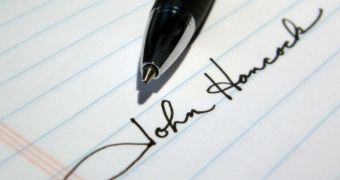Experts at the University of Haifa, in Israel, have recently developed a new method of detecting if a person is telling the truth, based entirely on the way that person writes. Eye-movement analysis, body-language assessments and other such techniques are no longer necessary, the developers of the new method write. They add that the way a person writes is a major indicator of their honesty, and that the technique they devised can accurately identify who is writing inventions, and who is writing the truth.
The scientists admit that, for now, the research is still in its basic form. But, they add, in the future, it could be developed to such levels, that it could be used to validate loan applications and insurance claims, The Telegraph reports. The essential idea that founds the new method is that the lying brain has to work extra-hard to make up facts, which in turn interferes with the normal way in which a person writes down words. In their experiments, the investigators asked 34 participants to write down two paragraphs of text, one featuring a real memory, and the other a fictional event.
In a paper detailing their discoveries, which appears in the latest issue of the respected scientific Journal of Applied Cognitive Psychology, the team reveals that each of the test subjects was given a wireless electronic pen, which had pressure sensors at the tip. After each participant wrote down his or her paragraphs, their sheets of paper were placed in a graphic tablet, and the writing style analyzed. According to the results, when people wrote down lies, they pressed the pen harder against the paper, their letters were taller, and they also made longer pen strokes.
“In the false writing condition, the average pressure, stroke length and height were significantly higher than in the true writing condition,” the authors wrote in their journal entry. “We know that people hesitate more when they lie and some companies already use this fact to see how long it takes people to tick boxes when filling in surveys online,” University of Hertfordshire psychologist, Professor Richard Wiseman told the Daily Mail. He was not involved in the new research.

 14 DAY TRIAL //
14 DAY TRIAL //